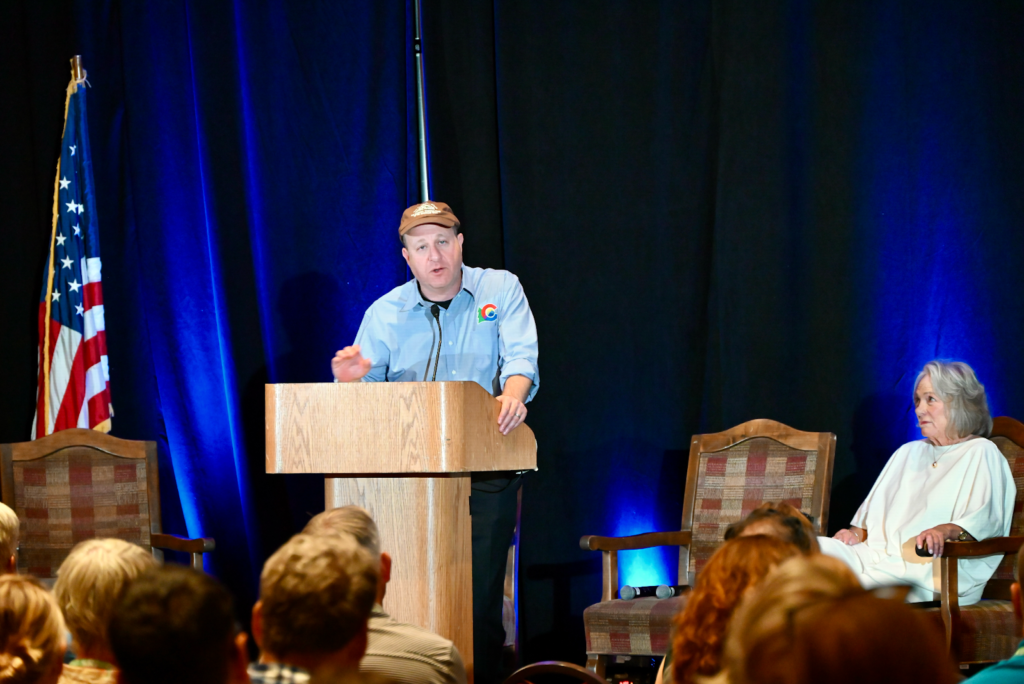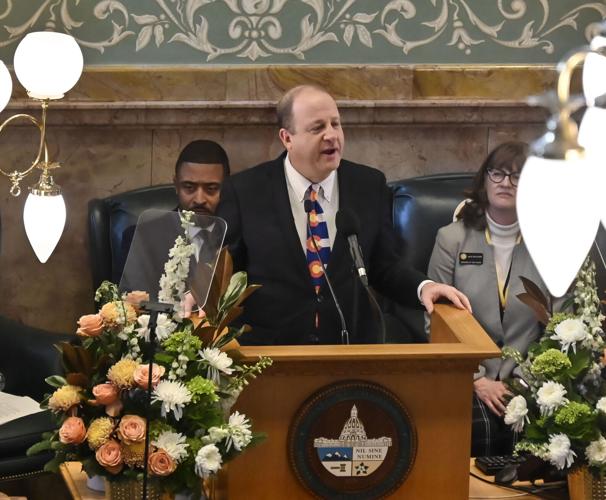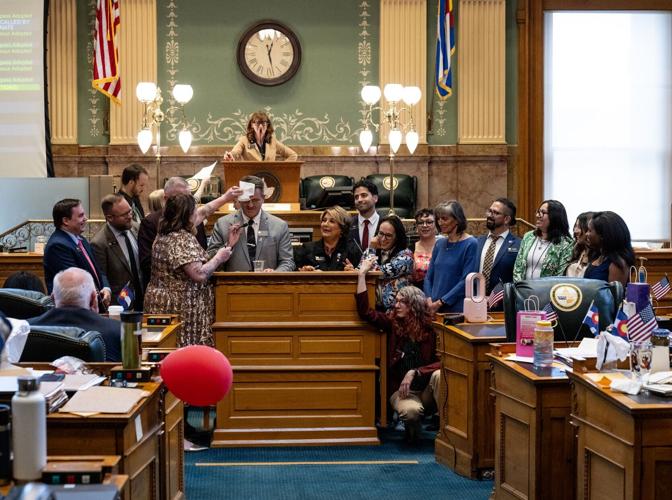Morphew prosecution team describes confusion over leadership in doomed case
An investigator and an attorney who left the 11th Judicial District’s prosecution team that tried to prosecute the Barry Morphew case said they grew frustrated with a case that was floating along without leadership, even up to the final days before a scheduled murder trial that never happened.
“It was pretty darn bad,” said former investigator Alex Walker.
“Who was in charge of the trial?” asked Colorado’s Presiding Disciplinary Judge Bryon Large.
“I have no idea,” responded Walker.
The exchange happened on Monday, part of a disciplinary hearing, in which 11th Judicial District Attorney Linda Stanley could get disbarred, publicly or privately censured, or acquitted. She is accused of professional misconduct associated with the Morphew case. Complaints filed against her claim she spoke. too freely with the media, specifically YouTubers, had “continual discovery violations and was a poor leader.”
The state’s Office of Attorney Regulation Counsel had brought the charges against Stanley after it discovered enough evidence to possibly support ethical violations. Complaints were made by a former judge and Morphew’s defense attorney.
A lawyer for Colorado’s Office of Attorney Regulation Counsel described Stanley during opening statements of the two-week hearing as an absent leader who failed to steer the case and let it crash.
“This is a case about a ship with a captain who never manned the bridge,” said attorney Jonathan Blasewitz, alleging Stanley violated attorney conduct rules.
During opening statements, Stanley’s attorney, former prosecutor Steve Jensen, pointed out that the district had few resources, and was expected to serve a four-county area.
The 11th Judicial District includes Chaffee, Fremont, Custer and Park counties.
Stanley’s hearing is expected to last two weeks. Among the witnesses scheduled to testify are Stanley herself, former judge Ramsey Lama, former Boulder district attorney Stan Garnett, Stanley’s secretary, and a few members of the prosecution team who worked on the Morphew case.
Walker — who was the lead investigator for the 11th Judicial District when Suzanne Morphew went missing and wrote Barry Morphew’s 129 page arrest affidavit — said Stanley’s habit of talking to the media, specifically YouTube channels, was the primary reason the case was moved to Fremont County in January 2022.
“I’ve worked for DA’s, and chief deputy DA’s, and I’ve never seen a district attorney talk to the media while a case was pending or being investigated,” Walker testified during Stanley’s disciplinary hearing.
When the case was moved, Lama oversaw the case until he granted a prosecution’s motion to dismiss it without prejudice nine days before it was scheduled to begin. Barry Morphew walked out of the courthouse a free man on April 19, 2022.
Dismissed without prejudice means that a case is dismissed, but can be refiled at some point.
Walker left Stanley’s office out of frustration and still works on the unsolved case as a commander with the Chaffee County Sheriff’s Office.
“It was hard to find Ms. Stanley in the office sometimes,” testified the first witness, Jeff Lindsey, who ran the case for Stanley before he left the district — also in frustration. Lindsey said that when he went to deliver his resignation letter, he had to put it on Stanley’s chair because he couldn’t find her.
“She just wasn’t around that much to bounce ideas off of,” Lindsey said.
With Stanley not seeking re-election, and Lindsey being the only candidate, it appears he will be the next 11th Judicial District Attorney in November. Lindsey was Stanley’s deputy district attorney.
Suzanne Morphew was a Maysville, Colorado wife and mother who vanished on Mother’s Day weekend, 2020. Her husband, Barry Morphew, was arrested a year later but his case was dismissed without prejudice in April 2022.
The case has been in the national spotlight in the four years since her disappearance, this time for alleged mishandling by Stanley.
Stanley has had at least four complaints filed against her, including one from defense attorney Iris Eytan, another from Fremont County Sheriff Allen Cooper and from former 11th Judicial District Judge Ramsey Lama, who oversaw the Morphew case in the last several months before he dismissed it without prejudice.
Since the scheduled trial, Lama, who is now in private practice, had accused Stanley of investigating him while the case was ongoing. Stanley and two of the people on her prosecution team suspected that Lama was biased because he struck a domestic violence witness.
It was Alex Walker whom Stanley and her part-time deputy district attorney called to ask him to interview Lama’s ex-wife. Stanley suspected that Lama may have had personal domestic violence problems, which ahw theorized may have been the reason that he struck the prosecution’s domestic violence expert.
Walker testified that he was “shocked I was even asked. I explained I could not speak for the sheriff but I would not do that.”
Stanley and her team eventually hired a district attorney investigator to interview Iris Lama, who denied that there was domestic abuse during her marriage to Lama. The matter was dropped.
In all, Lama struck 13 of 16 expert witnesses on the eve of trial. Lama struck them as sanctions because the prosecution had engaged in “consistent” discovery violations, missing “already extended deadlines” for data involving the witnesses.
Attorney Dan Edwards, whose job it was to file responses and replies for the Morphew case leading up to trial took the stand in Stanley’s hearing Monday. He said that he had a hard time getting the team to respond to his requests for information and warnings about deadlines.
In one email, he wrote in all caps, “EXPERT ENDORSEMENTS ARE DUE MONDAY” which he said was five days away. “No one responded,” he testified.
New jurisdiction, new start
The Morphew case has now been transferred to the 12th Judicial District, which is where Suzanne Morphew’s remains were found in September. Last month, her autopsy report revealed chemicals that are used to sedate wildlife in the bone marrow of her femur.
Butorphanol, azaperone and medetomidine are the same substances that Suzanne’s husband, Barry Morphew, told investigators he routinely used to immobilize deer before he removed their antlers.
Unusual circumstances
It’s been a quarter of a century since the Colorado Supreme Court censured prosecutors in a high profile case. The murder investigation of a Ft. Collins woman, Peggy Hetrick, who was sexually assaulted and left in a field, resulted in the incarceration of the teenager who found her. Tim Masters spent a decade in jail. In 1999, when his appeals had been denied, his lawyers petitioned for a new trial and asked for access to evidence for DNA testing.
In 2008, DNA evidence pointed to a different suspect and proved that Masters was wrongfully convicted. He was released.
While Masters was serving prison time, the prosecutors in the case, Terence Gilmore and Jolene Blair eventually were appointed as judges in Colorado.
Once Masters was found to be innocent, they were reprimanded by the Supreme Court for failing to disclose exculpatory evidence to Masters’ defense attorneys that could have pointed to his innocence. They acknowledged that they didn’t disclose the information.
Gilmore and Blair lost those 8th Judicial District seats as judges in Larimer County when they were not retained in the November 2010 election.
Although there were alternate suspects in the case, Hetrick’s murder has never been solved.
This story was written with the help of the Associated Press.










